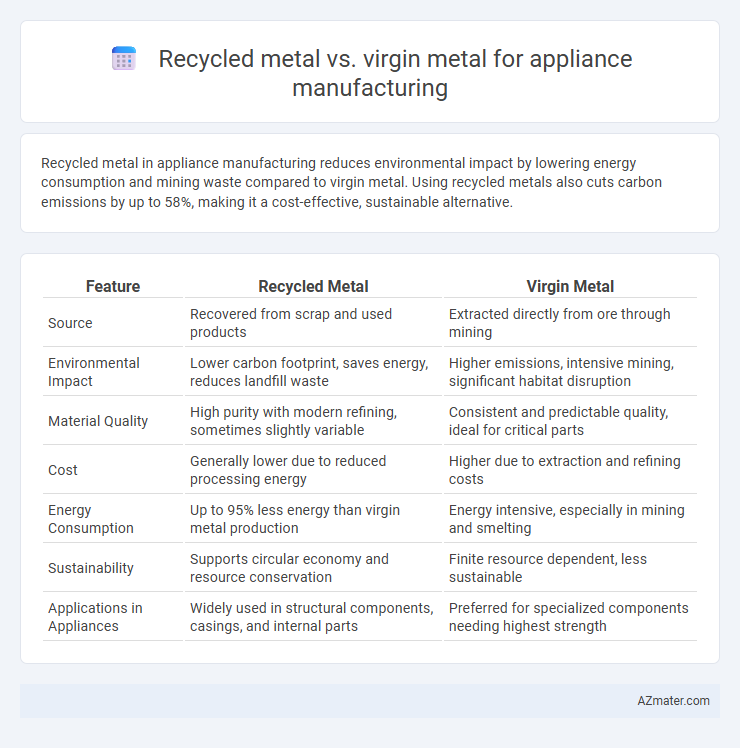Recycled metal in appliance manufacturing reduces environmental impact by lowering energy consumption and mining waste compared to virgin metal. Using recycled metals also cuts carbon emissions by up to 58%, making it a cost-effective, sustainable alternative.
Table of Comparison
| Feature | Recycled Metal | Virgin Metal |
|---|---|---|
| Source | Recovered from scrap and used products | Extracted directly from ore through mining |
| Environmental Impact | Lower carbon footprint, saves energy, reduces landfill waste | Higher emissions, intensive mining, significant habitat disruption |
| Material Quality | High purity with modern refining, sometimes slightly variable | Consistent and predictable quality, ideal for critical parts |
| Cost | Generally lower due to reduced processing energy | Higher due to extraction and refining costs |
| Energy Consumption | Up to 95% less energy than virgin metal production | Energy intensive, especially in mining and smelting |
| Sustainability | Supports circular economy and resource conservation | Finite resource dependent, less sustainable |
| Applications in Appliances | Widely used in structural components, casings, and internal parts | Preferred for specialized components needing highest strength |
Introduction to Metal Usage in Appliance Manufacturing
Metal is a fundamental material in appliance manufacturing, providing strength, durability, and thermal conductivity essential for products like refrigerators, ovens, and washing machines. Recycled metal offers an eco-friendly alternative by reducing environmental impact, conserving natural resources, and cutting energy consumption in production processes. Virgin metal, while often preferred for its purity and consistent quality, involves higher extraction and processing costs, making recycled metal increasingly vital in sustainable appliance manufacturing strategies.
Overview of Recycled Metal vs Virgin Metal
Recycled metal in appliance manufacturing offers significant environmental benefits by reducing energy consumption and raw material extraction compared to virgin metal, which is freshly mined and processed. Virgin metal provides consistent purity and mechanical properties essential for high-performance components, while recycled metal may require additional processing to achieve similar quality standards. Both materials play critical roles in sustainable manufacturing, with recycled metal contributing to circular economy goals and virgin metal ensuring durability and reliability in appliance production.
Environmental Impact: Recycled vs Virgin Metal
Recycled metal in appliance manufacturing significantly reduces environmental impact by lowering energy consumption and reducing greenhouse gas emissions compared to virgin metal extraction and processing. Utilizing recycled metals decreases the need for mining, which helps preserve natural habitats and reduces soil and water pollution. The energy savings from recycling one ton of metal can be up to 95% compared to producing the same amount of virgin metal, making it a more sustainable choice.
Cost Analysis and Economic Benefits
Recycled metal reduces raw material costs by leveraging scrap, lowering expenses in appliance manufacturing compared to virgin metal's higher extraction and processing fees. The energy savings from recycling metals, often up to 75% less than producing virgin metals, translate into significant operational cost reductions and enhanced profit margins. Utilizing recycled metal supports sustainable practices while stabilizing supply chains, mitigating price volatility associated with fluctuating raw metal markets.
Energy Consumption in Metal Production
Recycled metal in appliance manufacturing significantly reduces energy consumption compared to virgin metal production, using up to 95% less energy. Virgin metal production involves intensive mining, smelting, and refining processes that demand substantial fossil fuel energy inputs and emit higher greenhouse gases. Leveraging recycled metal not only lowers energy costs but also minimizes environmental impact, making it a sustainable choice for energy-efficient appliance manufacturing.
Material Quality and Performance Comparison
Recycled metal in appliance manufacturing often matches or exceeds the material quality of virgin metal, offering comparable tensile strength and corrosion resistance due to advanced refinement processes. Performance-wise, appliances made from recycled metal demonstrate durability and thermal conductivity on par with those crafted from virgin metal, ensuring reliable operation. The environmental benefits of recycled metal do not compromise structural integrity, making it a sustainable choice without sacrificing quality.
Supply Chain Sustainability and Resource Availability
Recycled metal significantly reduces the carbon footprint in appliance manufacturing by minimizing the need for energy-intensive mining and refining processes associated with virgin metal production. The supply chain benefits from increased resource availability as recycled metals can be sourced more consistently, lowering dependency on finite natural reserves and volatile market conditions. This enhances sustainability by promoting circular economy practices and reducing waste, ultimately fostering resilient and eco-friendly manufacturing operations.
Regulatory Compliance and Industry Standards
Recycled metal in appliance manufacturing must meet the same stringent regulatory compliance and industry standards as virgin metal, including certifications such as RoHS and REACH to ensure safety and environmental performance. Both materials undergo rigorous testing for durability, corrosion resistance, and contaminant levels to comply with consumer protection and environmental regulations. Using recycled metal supports sustainability goals without compromising adherence to legal and quality benchmarks essential in appliance production.
Consumer Perception and Market Trends
Consumer perception of recycled metal in appliance manufacturing increasingly favors environmental sustainability, associating it with reduced carbon footprints and eco-friendly practices. Market trends show a growing preference for appliances made with recycled metals due to rising demand for green products and stricter environmental regulations. Studies reveal that appliances incorporating recycled metal often achieve competitive pricing and enhanced brand loyalty, reflecting a shift towards circular economy principles in manufacturing.
Future Outlook: Innovations in Metal Recycling
Innovations in metal recycling for appliance manufacturing are rapidly advancing, with technologies like advanced sorting systems and electrochemical recovery enhancing the efficiency of recycled metal production. These breakthroughs reduce reliance on virgin metal extraction, lowering environmental impact and production costs. Future trends indicate increased integration of artificial intelligence and automation, optimizing resource recovery and promoting sustainability in the appliance industry.

Infographic: Recycled metal vs Virgin metal for Appliance manufacturing
 azmater.com
azmater.com